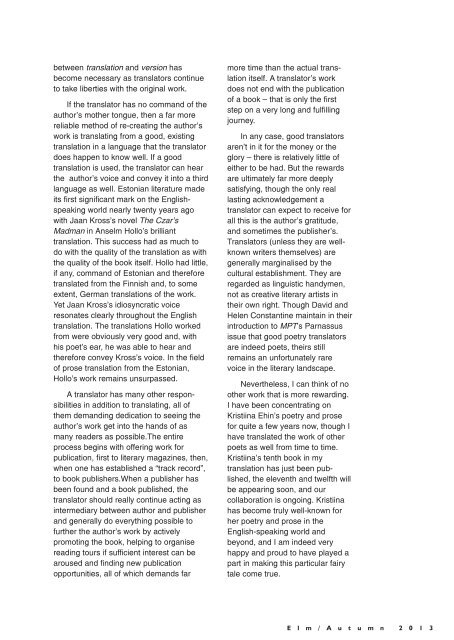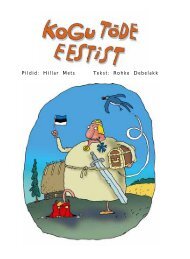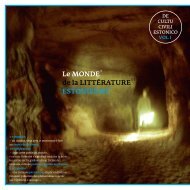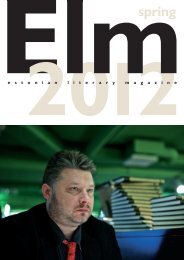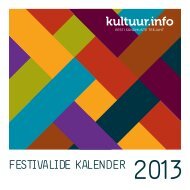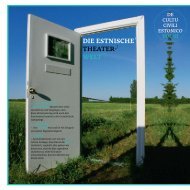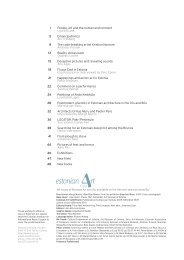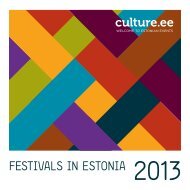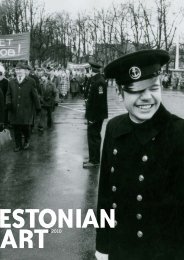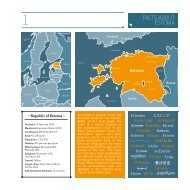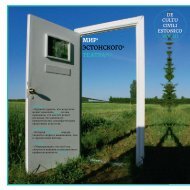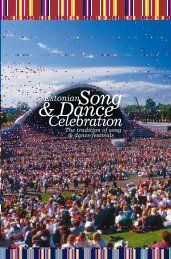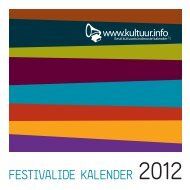Autumn 2013
Autumn 2013
Autumn 2013
You also want an ePaper? Increase the reach of your titles
YUMPU automatically turns print PDFs into web optimized ePapers that Google loves.
etween translation and version has<br />
become necessary as translators continue<br />
to take liberties with the original work.<br />
If the translator has no command of the<br />
author’s mother tongue, then a far more<br />
reliable method of re-creating the author’s<br />
work is translating from a good, existing<br />
translation in a language that the translator<br />
does happen to know well. If a good<br />
translation is used, the translator can hear<br />
the author’s voice and convey it into a third<br />
language as well. Estonian literature made<br />
its first significant mark on the Englishspeaking<br />
world nearly twenty years ago<br />
with Jaan Kross’s novel The Czar’s<br />
Madman in Anselm Hollo’s brilliant<br />
translation. This success had as much to<br />
do with the quality of the translation as with<br />
the quality of the book itself. Hollo had little,<br />
if any, command of Estonian and therefore<br />
translated from the Finnish and, to some<br />
extent, German translations of the work.<br />
Yet Jaan Kross’s idiosyncratic voice<br />
resonates clearly throughout the English<br />
translation. The translations Hollo worked<br />
from were obviously very good and, with<br />
his poet’s ear, he was able to hear and<br />
therefore convey Kross’s voice. In the field<br />
of prose translation from the Estonian,<br />
Hollo’s work remains unsurpassed.<br />
A translator has many other responsibilities<br />
in addition to translating, all of<br />
them demanding dedication to seeing the<br />
author’s work get into the hands of as<br />
many readers as possible.The entire<br />
process begins with offering work for<br />
publication, first to literary magazines, then,<br />
when one has established a “track record”,<br />
to book publishers.When a publisher has<br />
been found and a book published, the<br />
translator should really continue acting as<br />
intermediary between author and publisher<br />
and generally do everything possible to<br />
further the author’s work by actively<br />
promoting the book, helping to organise<br />
reading tours if sufficient interest can be<br />
aroused and finding new publication<br />
opportunities, all of which demands far<br />
more time than the actual translation<br />
itself. A translator’s work<br />
does not end with the publication<br />
of a book – that is only the first<br />
step on a very long and fulfilling<br />
journey.<br />
In any case, good translators<br />
aren’t in it for the money or the<br />
glory – there is relatively little of<br />
either to be had. But the rewards<br />
are ultimately far more deeply<br />
satisfying, though the only real<br />
lasting acknowledgement a<br />
translator can expect to receive for<br />
all this is the author’s gratitude,<br />
and sometimes the publisher’s.<br />
Translators (unless they are wellknown<br />
writers themselves) are<br />
generally marginalised by the<br />
cultural establishment. They are<br />
regarded as linguistic handymen,<br />
not as creative literary artists in<br />
their own right. Though David and<br />
Helen Constantine maintain in their<br />
introduction to MPT’s Parnassus<br />
issue that good poetry translators<br />
are indeed poets, theirs still<br />
remains an unfortunately rare<br />
voice in the literary landscape.<br />
Nevertheless, I can think of no<br />
other work that is more rewarding.<br />
I have been concentrating on<br />
Kristiina Ehin’s poetry and prose<br />
for quite a few years now, though I<br />
have translated the work of other<br />
poets as well from time to time.<br />
Kristiina’s tenth book in my<br />
translation has just been published,<br />
the eleventh and twelfth will<br />
be appearing soon, and our<br />
collaboration is ongoing. Kristiina<br />
has become truly well-known for<br />
her poetry and prose in the<br />
English-speaking world and<br />
beyond, and I am indeed very<br />
happy and proud to have played a<br />
part in making this particular fairy<br />
tale come true.<br />
E l m / A u t u m n 2 0 1 3


